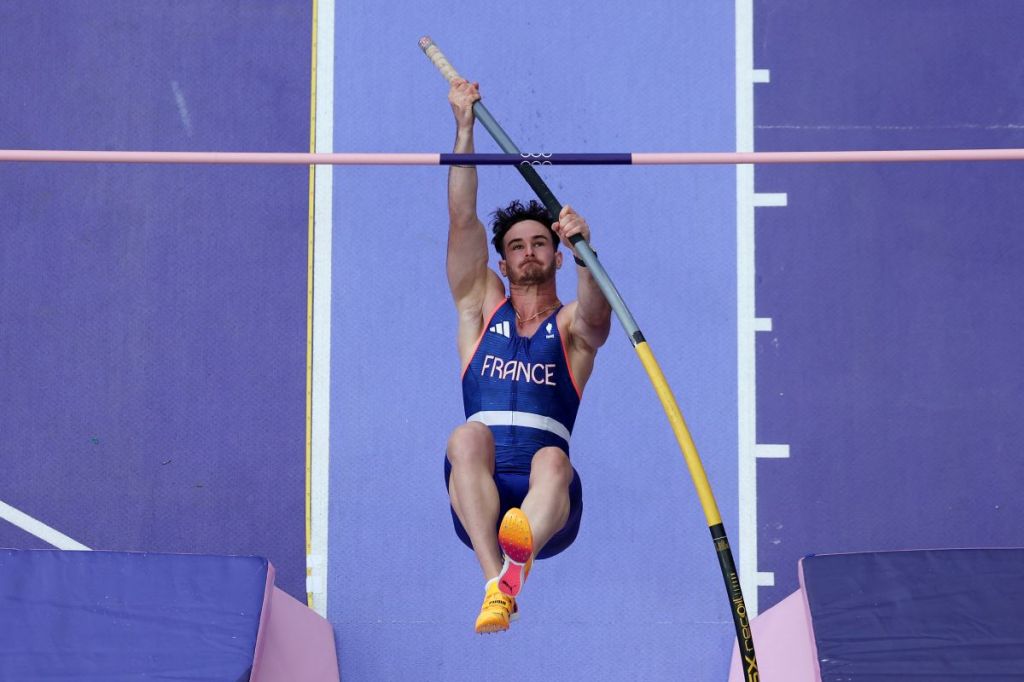The Olympics is all about sport, right? Well, that may be the case if you’re getting your Games coverage from Channel Nine and nowhere else. On social media, it’s a whole different story. The Olympics are actually about the so-called ‘main characters’.
First, there was the chocolate muffin affair: A Norwegian swimmer shared his obsession with the Olympic Village’s muffins on TikTok, prompting other athletes to share similar glowing reviews. The muffin storyline became such a viral phenomenon that followers tracked down the exact brand of muffin he was eating, and begged Costco to stock it in the USA.
Then there was the iconic Turkish shooter, who achieved a silver medal and had everyone speculating he was a hitman due to his oh-so-casual stance. We had the pole vaulter whose medal dreams were ruined by his penis, the hot pommel horse guy who looked like he was taking naps between routines, the Italian gymnast sponsored by Parmesan cheese… the list is endless.
Despite these athletes delivering world-class sporting performances and breaking records left right and centre, why is it that all we really care about is the memeification of it all?
Obsessed with this guy on the US men’s gymnastics team who’s only job is pommel horse, so he just sits there until he’s activated like a sleeper agent, whips off his glasses like Clark Kent and does a pommel horse routine that helps deliver the team its first medal in 16 years. pic.twitter.com/0D1ZqJjFa1
— Megan 📚 (@MegWritesBooks) July 29, 2024
Social media — I’m mostly talking about TikTok, let’s be real — has totally changed the way we watch the Olympics.
The head of TikTok’s global sports partnerships told the New York Times that within the first five days of the Games, nearly a quarter of a million creators had uploaded content using the #Olympics hashtag — an 822 per cent increase from the Tokyo Games.
Sure, some of these videos are about celebrating sporting achievements and sharing wins. But the majority — or at least it feels like it — are about the main characters of the Olympic Village.
The internet has always loved a main character, there’s no denying it. Back in 2019, user @maplecocaine tweeted: “Each day on Twitter there is one main character. The goal is to never be it.” It’s the perfect summary of what the internet has been like for the last five years.
Sometimes the main character of the day is a celeb gone rogue (Elon Musk, Derek Blasberg, JK Rowling), sometimes it’s a random civilian (the woman who tweeted “nobody remembers their best day in front of a tv”, or anyone who writes an anonymous op-ed for The Cut).
Perhaps it’s the relatability of these Olympic main characters that endears them so much to us. None of us can swim 50 metres in 20 seconds, but we do understand the joy of eating a really good chocolate muffin.
We’re not going to be able to understand the technical commentary of the shooting events, but we can all recognise that someone looks cool when they’re competing with a hand in their pocket.
The Olympic #shootingsport stars we didn’t know we needed.
🇰🇷 Kim Yeji 🤝 Yusuf Dikeç 🇹🇷 pic.twitter.com/gfkyGjFg4I
— The Olympic Games (@Olympics) August 1, 2024
The state of the content creator industry has also changed the Games. We’re seeing behind-the-scenes tours of the Olympic Village, GRWM videos from competitors in Paris, and elite athletes joining in on memes and discourse.
It’s no secret that the majority of our Olympic athletes are paid a pittance (especially when compared to golfers and tennis players), so why wouldn’t they want to pocket some extra cash from ad revenue or sponsored content?
US rugby player Ilona Maher told the New York Times something similar: “It’s about building the brand. We are female rugby players — we’re not getting million-dollar contracts, we’re not getting paid the money that we should be.”
And let’s not forget that the majority of athletes we’re seeing pop up in our feeds belong to Gen Z: making content is in their DNA.
@sunisalee_😭🥲🥲♬ Star Spangled (Bass Boosted) – SNC
The Olympics is one of the rare occasions where everyone in the world is invested in the same thing. The social media talking points of the day aren’t rooted in US politics, tied to a popstar’s new album, or reliant on an understanding of a niche HBO show. We’re all united by a common interest.
And it just so happens that the main characters are a far more interesting, and at times rewarding, storyline to follow the sport itself.
Sure, I’ll spend a few minutes watching Jess Fox win gold, and feel that sense of Aussie pride. But that doesn’t compare to the serotonin boosts from seeing hilarious tweets about the pole vaulter’s giant wang every time I open TikTok or Twitter.
Read more stories from The Latch and subscribe to our email newsletter.







